Revoking special status: A Kashmiri nightmare come true
By repealing Article 370, the Modi govt inches closer to altering Indian Occupied Kashmir's demography
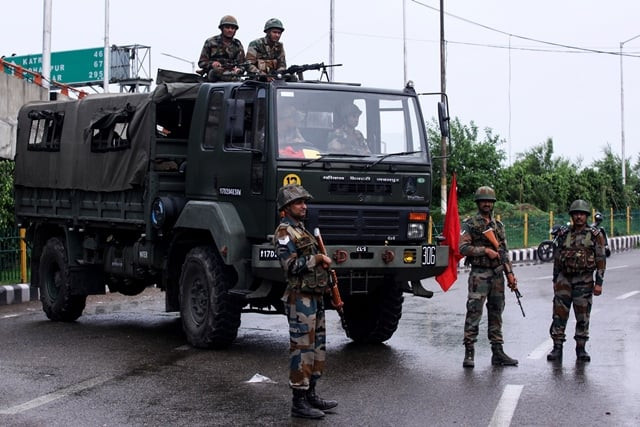
PHOTO: AFP
Over the past week, the occupied valley has been engulfed with panic and dread – a state most Kashmiris identify as normal. Yet this time around, the gloom has cast its shadows over the entire region. With India on the brink of removing the special status granted to the held-Kashmir - the world began to notice.
The Narendra Modi-led government on Thursday deployed 28, 000 troops in addition to the 10, 000 already deployed since a week before. According to Indian media, over 281 companies of the paramilitary forces had been received in the occupied Kashmir. A day later, it issued travel advisory asking tourists to curtail their stay.
"There is lot of uncertainty and panic among the people. Even the pro-India politicians including former chief ministers are clueless," a Srinagar resident told The Express Tribune on conditions of anonymity. "There is growing anxiety and residents are storing rations preparing for the worst possible eventuality."
The troop movement gave rise to speculations that the Bharatiya Janata Party (BJP) was set to abrogate Article 35A and Article 370 of the Indian constitution. The prediction came true: Indian Home Minister Amit Shah, staying true to his election promises, on Monday introduced a bill repealing the constitutional laws. The reorganisation bill defines occupied Jammu and Kashmir as a Union Territory with an assembly while Ladakh as a separate Union Territory with no legislature.
"It is obvious that the troop deployment was intended to curtail reaction to the move to remove special status of occupied Jammu and Kashmir," said senior journalist Tariq Naqash. "The mention of an 'impending' attack in the travel advisory was just a pretence. The Indian government expected strong reaction from the Kashmiri people and even the pro-India politicians."
The move comes at a time when South Asia is undergoing a paradigm shift as the United States and Taliban come closer to a deal brokered by Pakistan.
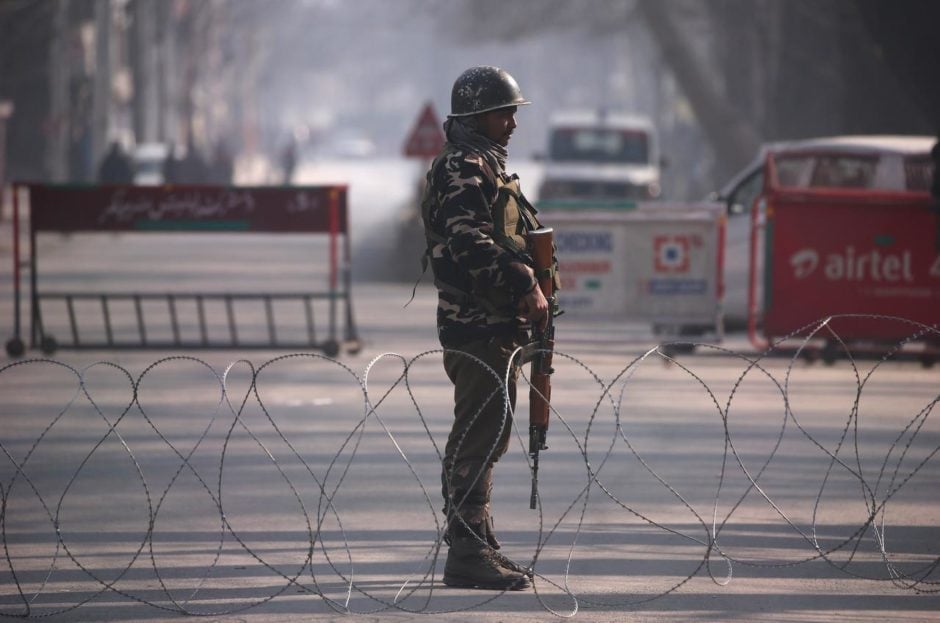 Indian troops lock down IoK city. PHOTO: REUTERS
Indian troops lock down IoK city. PHOTO: REUTERS"We should certainly see what's playing out in Kashmir now against the backdrop of Afghanistan," Deputy Director of the Asia Programme at The Wilson Centre Michael Kugelman told The Express Tribune. "What we're seeing there is a rapidly progressing peace process, facilitated to a great extent by Pakistan, that may result in a political settlement that puts the Taliban in some type of position of power."
With Prime Minister Imran Khan and US President Donald Trump hitting reset on their respective countries' ties during the former's July visit to the White House, India appears apprehensive of what better US-Pakistan relations alongside a pro-Pakistan government in Afghanistan may mean for the region.
"India is understandably concerned about any post-war outcome in Afghanistan that gives the Taliban a prominent political role," Kugelman continues. "For India, intensifying its already-hard line in Kashmir is a way to push back against Pakistan as Islamabad's hand is strengthened, and New Delhi faces setback, in Afghanistan."
Indo-Pak ties have been intense since the February standoff that led to the capture and subsequent release of an Indian Air Force wing commander. Recently, Trump offered to mediate between Islamabad and New Delhi for peace talks. Predictably, the statement drew the ire of Indian political and media.
Kugelman, however, is skeptical about the extent of Trump's offer. "I don't think we should overstate the significance of Trump's references to mediation in Kashmir, though certainly they do suggest that the White House is aware of the conflict and its worsening trend lines."
"In reality, I can't imagine the White House wanting to get involved. First, Trump's most recent comment was that he would mediate if asked by India. But India certainly won't ask. Second, the US continues to put its foot on the accelerator of its relationship with India, and it won't want to position itself as a mediator because it knows that India is allergic to external mediation on Kashmir."
Quoting former British premier Winston Churchill, "The Americans will eventually take the right decision but only after exhausting all other means", Ibrahim Qazi of Jamaat-e-Islami said the geo-political scenario favoured Pakistan as Washington has no alternate to materialise a reconciliation deal in Afghanistan.
"Only if tensions in Kashmir escalate to the point of a conflict will we see the Trump administration offer to get involved - but still, only as a crisis and conflict manager and not as a mediator on Kashmir," Kugelman adds.
By kindling tensions in the occupied valley, India may be testing waters to get an idea of how far the Trump administration is willing to intervene on Pakistan's behest. The ensuing situation will be a test for a newly energised US-Pakistan political alliance.
Trump, who usually expresses his opinion on Twitter, is yet to respond to the situation but the US State Department issued a statement urging peace and stability along the LoC. "We are concerned about reports of detentions and urge respect for individual rights and discussion with those in affected communities," said Morgan Ortagus.
India abolishes occupied Kashmir special status with rushed decree
The legal way out
The move to change the special status granted to Kashmir is a violation of multiple resolutions passed by the United Nations Security Council and the Simla Agreement, 1972 which prevent both the countries from unilaterally altering the situation (status or boundaries) until the final settlement of the conflict.
Yet Pakistan is left with limited options to prevent India from scrapping the constitutional laws.
Speaking to The Express Tribune over approaching the International Court of Justice, former legal adviser to the foreign ministry Sikander Shah says Pakistan will have to find a particular treaty signed between New Delhi and Islamabad that contains a compromisory clause that allows dispute resolution by the ICJ.
(Read Article 36 of the Statute of the ICJ here.)
"The caveat is that the ICJ has limited jurisdiction when it comes to the interpretation of a treaty which minimises its scope to examine violations committed by India in light of the international laws."
However, Shah thinks Pakistan can raise UN conventions and the Simla Agreement as an awareness campaign to highlight violations of international laws. "Pakistan may treat it as an individual and collective human rights violation under the treaty and customary international laws. The repeal would jeopardise the recognised right of self-determination of the Kashmiri people as altering the demographics may lead to forced transfers of indigenous populations which qualifies as a crime against humanity when part of a systematic attack directed against any civilian population, as determined by the International Criminal Tribunal for Rwanda."
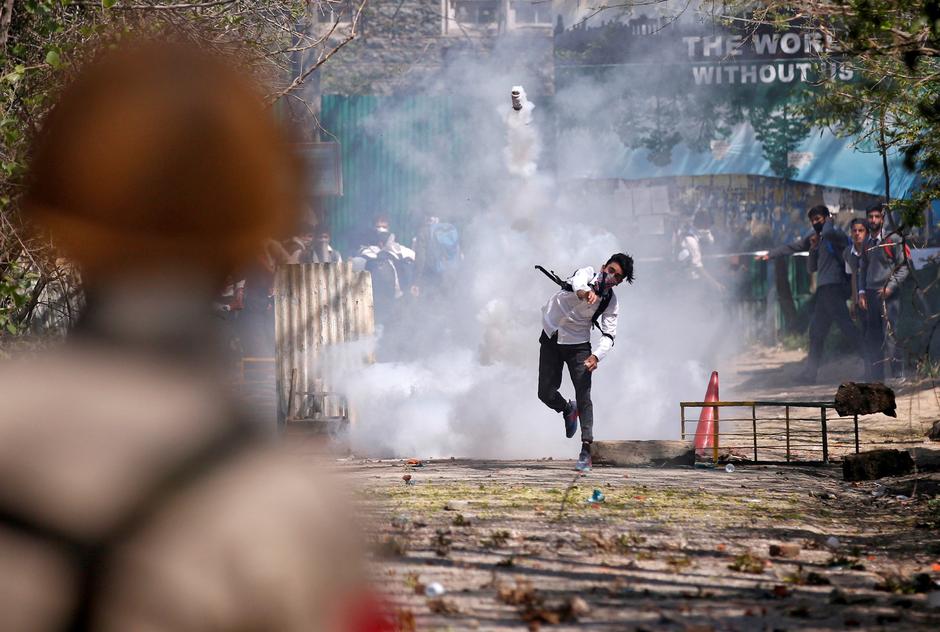 A Reuters file photo of protests against Indian troops in the occupied valley.
A Reuters file photo of protests against Indian troops in the occupied valley.But there is hope for the Kashmiri people should the UNSC determine the situation to be a threat to international peace and security.
The chapter VII of the charter of the UN allows the UNSC to intervene if it determines "any threat to the peace, breach of the peace, or act of aggression" to "maintain or restore international peace and security."
Article 41 of the UN charter states that the UNSC "may decide what measures not involving the use of armed force are to be employed to give effect to its decisions, and it may call upon the Members of the United Nations to apply such measures. These may include complete or partial interruption of economic relations and of rail, sea, air, postal, telegraphic, radio, and other means of communication, and the severance of diplomatic relations."
If these measures prove to be inadequate to curtail the threat, the ensuing Article 42 allows UNSC to "take such action by air, sea, or land forces as may be necessary to maintain or restore international peace and security. Such action may include demonstrations, blockade, and other operations by air, sea, or land forces of Members of the United Nations."
On Monday, UN Secretary-General Antonio Guterres has urged India and Pakistan to exercise restraint.
So far, Pakistan has rejected the Indian announcement and summoned the Indian High Commissioner Ajay Biseria to convey a strong demarche on the actions taken by the Modi government.
Analysis: Pakistan's diplomacy on trial
Officiating the occupation
In occupied Kashmir, the Indian government-imposed Section 144 of the CrPC. Local political leaders have been detained or arrested. Former chief ministers of the occupied valley, Omar Abdullah and Mehbooba Mufti were placed under house arrest.
In an audio message posted on Twitter, Mufti condemned the Indian government for revoking the 1952 Delhi Agreement between the post-independence Nehru government and the Prime Minister of Jammu and Kashmir Sheikh Abdullah.
The agreement granted the Indian citizenship to residents of the occupied valley and gave the state legislature the power to make laws for conferring special rights and privileges on the residents.
In 1954, then Indian President Rajendra Prasad introduced Article 35A through the vested powers of Article 370(i)(d) of the Indian constitution that allows the president exceptions and modifications in the constitution with concurrence of the government in IOK. The 1954 Constitutional Order was passed by the Indian parliament to implement the Delhi Agreement.
To sum up Article 35A and Article 370, the former confers special rights and privileges upon the residents of IOK including the right to define who qualifies as 'permanent resident' and prohibits non-permanent residents from purchasing immovable property, acquiring lands and applying for government jobs, scholarships, aids and other public welfare projects. The latter grants special status to the state of Jammu and Kashmir – the occupied territory. It exempts IoK from complete applicability of the Indian constitution and limits the powers of the Centre. Article 370 can be amended or repealed only upon the recommendation of the state's constituent assembly. Introduced as a "temporary" provision, the article acquired permanent status when the constituent assembly was dissolved in 1957.
"India is trying to split the region into three branches comprising Jammu, Kashmir and Ladakh," says Qazi.
This is not the first attempt to curtail Kashmiris' rights, the Indian Supreme Court has struck down multiple cases demanding scrapping of Article 35A and Article 370. In 2018, India's top court opined, "since the state constituent assembly has been discontinued, the President of India would not be able to implement or execute the obligatory provisions required for its [Article 370] withdrawal."
The abolition of the articles would allow "outsiders" to acquire property and settle in the occupied valley. Locals fear this move is intended to reduce Kashmiris to a minority to change the demographics. "It will be difficult for us to maintain properties back home," a Kashmiri student in New Delhi told The Express Tribune on condition of anonymity. "Outsiders settling in Kashmir would allow the Indian government to rig the odds in their favour in case of an international intervention."
India has vehemently opposed internationalising the Kashmir conflict and denied access to international rights groups including the UN for independent inquiry of human rights violations by its troops in IOK.
But with the world beginning to pay attention to the Kashmir conflict and Pakistan's strengthened position in the region, changing the demography of the occupied valley to present a pro-India aspect may be the Modi government's strategy to counter globalisation of the cause.
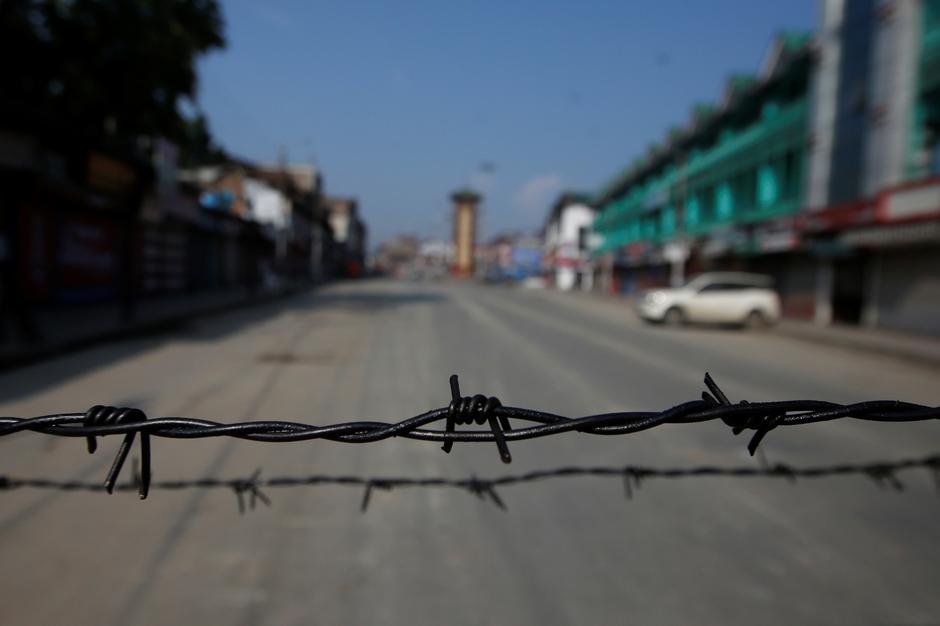 India imposes curfew in the occupied territory. PHOTO: REUTERS
India imposes curfew in the occupied territory. PHOTO: REUTERSLast year, the Modi government came under scrutiny when the United Nations High Commissioner for Human Rights (OHCHR) published a report revealing "impunity for human rights violations and lack of access to justice" to be human rights challenges in IoK.
Earlier this year, India was invited as an honorary guest at a Organisation of Islamic Corporation (OIC) session in Abu Dhabi. Ironically, during the same moot, the members passed a resolution condemning human rights violations committed by the Indian troops in the occupied valley.
Qazi claims New Delhi intends to declare LoC and WB as international borders by moving towards Chambh to Batal sector to negotiate from a point of strength. "The ball is in Pakistan's court whether it will fight militarily or wait for intervention of a super power. The [Hurriyet] leadership in Kashmir is ready to face another phase of oppression anticipating freedom from shackles of the Indian Army sooner or later, time will tell," he added.
Often called paradise on earth, the region remains besieged. Since 1989, the curfews and bloodshed in the disputed territory has claimed over 95, 000 killings of which 7, 128 were custodial. At least 146, 907 civilians have been arrested, 109, 378 structures destroyed and over 11, 000 women raped.
"It's a complicated state of affairs. The conventional wisdom is that eliminating Kashmir's special status could spark major unrest in Kashmir. And that's certainly true," Kugelman reflects. "But one could also argue that abrogating Article 35A could embolden those in Kashmir that most fervently want independence from India, as removing the autonomous status would give them fresh momentum to advocate for a full separation."
"Still, no matter how you slice it, abrogating Article 35A would plunge Kashmir and India-Pakistan relations into an immediate crisis. And a region that's a powder keg even during calmer moments could well explode," he adds.



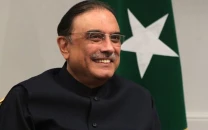
1724319076-0/Untitled-design-(5)1724319076-0-208x130.webp)

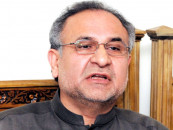












COMMENTS
Comments are moderated and generally will be posted if they are on-topic and not abusive.
For more information, please see our Comments FAQ